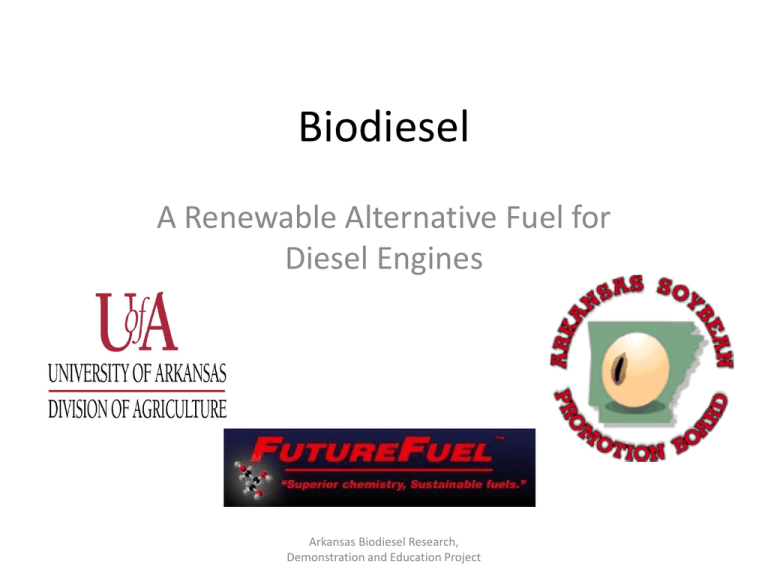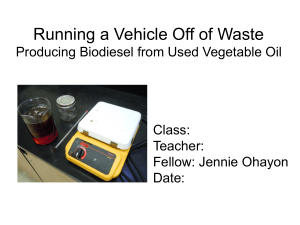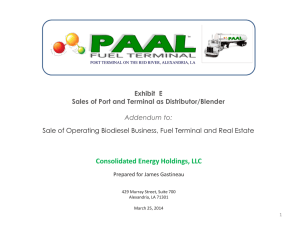Biodiesel
advertisement

Biodiesel A Renewable Alternative Fuel for Diesel Engines Arkansas Biodiesel Research, Demonstration and Education Project Outline • • • • • • What is biodiesel? What can be used to make biodiesel? How is biodiesel manufactured? How is biodiesel used? What are the benefits of biodiesel? What are the effects of biodiesel on the environment and human health? • How will using biodiesel affect my engine warranty? • What about cold weather operation? • How does biodiesel perform in engines? Arkansas Biodiesel Research, Demonstration and Education Project What is Biodiesel? • Biodiesel is a renewable, alternative fuel for use in compression-ignition (diesel) engines • Biodiesel is a fuel comprised of mono-alkyl esters of long chain fatty acids derived from vegetable oils or animal fats, designated B100, and meeting the requirements of ASTM D6751 Arkansas Biodiesel Research, Demonstration and Education Project Biodiesel IS IS NOT • A commercially-manufactured fuel that meets specific, recognized quality standards This fuel was manufactured in a BQ 9000 facility it meets ASTM D6751 quality standards! • Raw vegetable oil • Filtered grease or cooking oil This fuel was made in Bob’s shed – it meets Bob’s quality (?) standards! Do you trust Bob??? Arkansas Biodiesel Research, Demonstration and Education Project ASTM D6751 Biodiesel Standard Arkansas Biodiesel Research, Demonstration and Education Project What can be used to make Biodiesel? • Oil Seeds – – – – Soybeans Canola Cottonseed Sunflowers • Animal Fats – Beef tallow – Pork lard • Recycled cooking oils/greases • Algae • Other Arkansas Biodiesel Research, Demonstration and Education Project How is Biodiesel Manufactured? 100 – lbs. Feedstock • Vegetable oils • Animal fats • Waste fats/oils 10 – lbs. Methanol Plus Catalyst Transesterification Crude Biodiesel Refining Biodiesel Crude Glycerin Methanol Recovery Glycerin Refining Glycerin 10 – lbs. Arkansas Biodiesel Research, Demonstration and Education Project 100 – lbs. How is Biodiesel Used? • Pure biodiesel (B100) is normally “blended” with petroleum diesel for use in engines. • Biodiesel blends are designated by the % biodiesel they contain: Biodiesel blends are designated according to the % of biodiesel – B5 • 5% biodiesel • 95% petroleum diesel – B20 (most common blend) • 20% biodiesel • 80% petroleum diesel – Can be used in most CI engines with no modifications Arkansas Biodiesel Research, Demonstration and Education Project Physical and Chemical Characteristics of D2, B20 and B1001 Fuel Specific gravity Lbs/gal BTU/lb BTU/gal D2 0.835 6.963 19,764 (100%) 137,617 (100%) B20 0.862 7.189 18,917 (-4.3%) 135,994 (-1.2%) B100 0.866 7.389 17,111 (-13.4%) 126,433 (-8.1%) 1 Values from the NREL Fuels Database Arkansas Biodiesel Research, Demonstration and Education Project What are the Benefits of Biodiesel??? Biodiesel: • Is renewable • Is domestically-produced • Is non-toxic and biodegradable • Blends up to B20 require no (or minor) vehicle modifications • Increases lubricity of fuel • Reduces global warming gasses • Reduces tailpipe emissions Arkansas Biodiesel Research, Demonstration and Education Project What are the Effects of Biodiesel on the Environment and Human Health? Average Emissions Reduction with Biodiesel • Biodiesel Reduces: – Hydrocarbons • Human Carcinogen – Particulates • Human Carcinogen – Carbon Monoxide • Human Toxin – CO2 (lifecycle basis) • Greenhouse gas – Effect on NOX emissions is unclear Source: US Environmental Protection Agency Arkansas Biodiesel Research, Demonstration and Education Project • Greenhouse gas • Contributes to smog • Health hazard B20 Reduces Harmful Emissions Relative to Petroleum Diesel 0% -5% -10% -10% -11% -15% -15% -20% -21% -25% PM CO HC CO2 Arkansas Biodiesel Research, Demonstration and Education Project Source: US DOE, 2008 B20 Reduces Lifecycle CO2 Emissions by 15% Relative to Petroleum Diesel Arkansas Biodiesel Research, Demonstration and Education Project How will using Biodiesel Affect My Engine Warranty? • Engine and vehicle manufacturers warranty materials and workmanship only – not fuels. • Any engine damage due to fuel quality (either diesel or biodiesel) is not covered by the manufacturer’s warranty. – Only use biodiesel from a BQ-9000 certified source. • Federal law prohibits voiding an engine warranty due to the use of biodiesel; UNLESS the biodiesel is proven to be the cause of failure. • Most manufacturers make specific recommendations about the use of specific biodiesel blends. Arkansas Biodiesel Research, Demonstration and Education Project Does My Engine Manufacturer Approve the Use of Biodiesel? • These (and other) manufacturers approve the use of various biodiesel blends in some or all of their engines. – Must meet ASTM D6571 quality standard Arkansas Biodiesel Research, Demonstration and Education Project What about Cold Weather Operation? • Biodiesel gels at higher temperatures than diesel – Gelling temperature increases with: • Higher blends (B20 vs. B5) • Animal-based feedstock – Gelling temperature can be decreased with commercial “pour point depressants” • One manufacturer claims to lower gelling temperature to -40 ⁰F for B20. Arkansas Biodiesel Research, Demonstration and Education Project UA Biodiesel Test Results • Kubota RTV900 Utility Vehicles • John Deere 3203 Compact Utility Tractor • John Deere PowerTech M 4.5 L irrigation engine Arkansas Biodiesel Research, Demonstration and Education Project Kubota RTV900 Diesel Utility Vehicle Arkansas Biodiesel Research, Demonstration and Education Project Fuel Efficiency – Diesel vs. B20 In-Use Tests 0.9 0.8 0.700 0.7 Diesel 0.600 B20 0.6 0.5 0.4 0.646 0.689 0.3 sfc (kg/kWh) Hours per liter Lab Tests 0.800 0.500 0.400 0.300 0.2 0.200 0.1 0.100 0 0.000 B20 Diesel 2800 2900 3000 3100 Engine speed (rpm) Arkansas Biodiesel Research, Demonstration and Education Project 3200 Power Output – Diesel vs. B20 Power (kW) D2 B20 15 10 5 0 2800 2900 3000 3100 Engine speed (RPM) Arkansas Biodiesel Research, Demonstration and Education Project 3200 John Deere 3203 Compact Utility Tractor Arkansas Biodiesel Research, Demonstration and Education Project John Deere 3203 Compact Utility Tractor Arkansas Biodiesel Research, Demonstration and Education Project PowerTech M Irrigation Engine Arkansas Biodiesel Research, Demonstration and Education Project Rated Engine Speed (2400 rpm) Arkansas Biodiesel Research, Demonstration and Education Project Pumping Speed (1800 RPM) Arkansas Biodiesel Research, Demonstration and Education Project Summary - How Does Biodiesel Affect Engine Performance? • Blends of up to B20 – No appreciable differences in: • Power (~ 1-2%) • Torque (~ 1-2%) • Fuel efficiency (~ 1-2%) – No effect on: • Engine life • Engine wear – Decrease in: • CO • Hydrocarbons • Particulate matter Mobile Biodiesel Demonstration Unit – Effect on NOX varies Arkansas Biodiesel Research, Demonstration and Education Project







